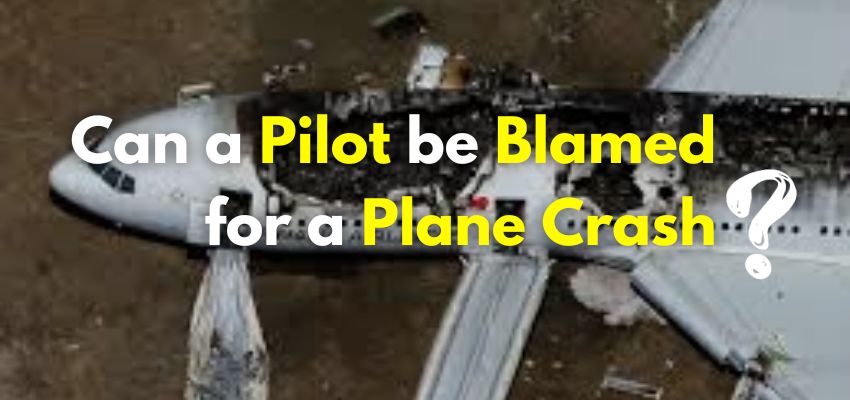Flying is one of the safest modes of transportation, thanks to rigorous safety measures and the dedication of pilots to ensure a smooth journey. However, when a plane crash occurs, it often raises questions about who is to blame. Can a pilot be held responsible for a plane crash? In this blog, we’ll explore this complex issue and shed light on the various factors involved.
What is a role of a Pilot during a Plane Crash?
The role of a pilot during a plane crash is critical and can make a significant difference in the outcome of the incident. When a plane crash is imminent or inevitable, here is the pilot’s role:
Maintain Control: The pilot’s primary objective during a crisis is to maintain control of the aircraft for as long as possible. They strive to keep the plane stable and prevent it from entering uncontrolled flight.
Communicate: Pilots communicate with air traffic control (ATC) to report the emergency situation and request assistance.
Initiate Emergency Procedures: Pilots are trained to follow specific emergency procedures for various scenarios. These procedures may involve shutting down malfunctioning engines, deploying emergency equipment like oxygen masks or life rafts, if necessary.
Choose Landing Site: If a crash landing is unavoidable, pilots aim to select the safest available landing site, which may not necessarily be an airport.
Use Flight Experience: Pilots draw upon their extensive training and experience to make quick and informed decisions. They may attempt emergency maneuvers, such as a controlled descent or a water ditching, to increase the chances of survival.
Calm Leadership: Throughout the crisis, pilots are expected to remain calm and provide clear instructions to the cabin crew and passengers. Their leadership can help maintain order and reduce panic among those on board.
Evacuation and Rescue: After a crash, if the aircraft comes to a stop, pilots may assist with the evacuation process, helping passengers and crew exit the aircraft safely.
Cooperate with Emergency Services: Once on the ground, pilots cooperate with emergency response teams, providing information about the aircraft’s condition and any injured passengers. port are provided promptly.
It’s important to note that pilots are well-trained to handle emergency situations, and their actions can significantly impact the chances of survival during a plane crash.
What are the factors that influence a plane crash?
Mechanical Failures
Aircraft are complex machines, and mechanical failures can occur despite regular maintenance. These failures can include engine malfunctions, electrical issues, or problems with the plane’s structure. In such cases, it is usually not the pilot’s fault.
Weather Conditions
Weather plays a significant role in aviation safety. Severe weather conditions like thunderstorms, turbulence, and low visibility can challenge even the most experienced pilots. Pilots do their best to navigate through adverse weather, but sometimes, accidents happen due to extreme conditions beyond their control.
Air Traffic Control
Air traffic controllers guide aircraft in the airspace, helping to prevent collisions and ensure orderly movement. Miscommunications or errors on the part of air traffic controllers can contribute to accidents, but pilots rely on their instructions to a great extent.
Human Error
Human error, including pilot error, is a leading cause of plane crashes. While pilots are trained to handle various situations, they can make mistakes, misjudge circumstances, or overlook critical details. However, it’s essential to remember that pilots are only human, and they undergo extensive training to minimize the likelihood of such errors.
Did you know?
There were more than 72 Aviation accidents in the year 2023, here is are the details of Air Travel Accidents of Passenger aircraft in 2023 — How Many Plane Crash in 2023 were there?
How can a pilot blamed for plane crash?
Blaming a pilot for a plane crash is a complex process that involves a thorough investigation to determine whether the pilot’s actions or decisions directly contributed to the accident. Here are some key factors that can lead to a pilot being blamed for a plane crash:
Violation of Procedures: If a pilot is found to have violated established standard operating procedures, it can lead to accountability. This might include ignoring checklists, failing to follow safety protocols, or making decisions that go against established guidelines.
Poor Decision-Making: Making poor decisions that compromise safety can result in blame. Pilots are expected to exercise sound judgment in all situations. If it is determined that a pilot’s decisions were reckless or negligent, they may be held responsible.
Negligence: Negligence refers to the failure to exercise the level of care and diligence expected of a reasonably prudent pilot. Negligent actions, such as neglecting to conduct proper pre-flight checks or ignoring warning signs, can result in a pilot being blamed.
Failure to Adapt: Pilots are trained to adapt to changing circumstances, especially in emergency situations. If a pilot fails to adapt appropriately to unexpected events or fails to follow established emergency procedures, it can contribute to the crash.
Intoxication or Impairment: If it is determined that a pilot was under the influence of alcohol or drugs at the time of the crash, they can be held criminally and civilly liable for their actions.
Inadequate Training or Qualifications: If a pilot is found to be inadequately trained or not qualified to operate the specific type of aircraft involved in the crash, their lack of competence can lead to blame.
Conclusion
In the world of aviation, the question of whether a pilot can be blamed for a plane crash is a complex one. Investigations into plane crashes aim to uncover the true cause and prevent future accidents rather than assigning blame.
Pilots are only held accountable if their actions or decisions directly contributed to the accident, and this determination is made after a thorough and objective analysis.





0 Comments